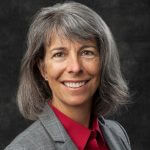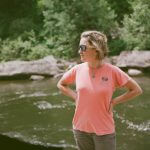Catherine Coleman Flowers
Montgomery, Alabama
Catherine Coleman Flowers is the founding director of the Center for Rural Enterprise and Environmental Justice. Catherine founded the Alabama Center for Rural Enterprise to address the root causes of poverty in Alabama. Now an internationally recognized advocate for the human right to water and sanitation, she works tirelessly to promote sustainable initiatives that strengthen families in rural and impoverished communities.
Catherine was recognized as a River Hero at River Rally 2020. Also in 2020, Coleman Flowers was named a MacArthur Fellow.
This interview was conducted by Carly Schmidt on January 14, 2020. Learn more about Catherine’s work and the Rural Enterprise and Environmental Justice (CREEJ).
I was looking through the Wild & Scenic Film Festival options for River Rally and came across Southern Exposure’s film The Accidental Environmentalist. What makes you the accidental environmentalist?
I started out as a teacher and also a civil-rights and education activist, but I grew to learn how it was all connected. Civil rights, environmental justice, and education are all connected and I was able to bridge the gap between my upbringing as a country girl in a rural community, which is part of who I am, and my appreciation for nature and water. I call myself the accidental environmentalist because I didn’t start out on this path and couldn’t have predicted 20 years ago that I would ever be called an environmentalist. It was an evolutionary process.
What motivated and inspired you to step up and lead the way on these issues in Alabama?
When I first came back home to Alabama my focus was on economic development. Later, I learned that you can’t look at economic development without looking at the environment. At the beginning, in a quest to finding to find economic inclusion in Lowndes County, Alabama, I found out that people were being arrested who could not afford on-site septic systems. As we’ve looked into this over the years, we realized that it is much more complex. People living in poverty were being pursued who could not afford on-site sanitation. Then we found out that people were paying for on-site sanitation that wasn’t working, but they were being cited and fined. We realized that people were being held responsible for damage done by damaged septic systems, whereas the big industries could pollute the rivers and nothing happened to them.
I was invited to speak for the Alabama Rivers Alliance and I talked about how we’re all on the same side and fighting for the same things. We kind of joined together from that point on – the environmental justice folk and the riverkeepers – because we realized we had common ground. That’s how I started this fight. I started off fighting for people’s access to wastewater treatment in rural communities. You can’t talk about water without talking about sanitation and wastewater.
What actions have made a difference to people in rural communities who are being wrongfully pursued?
The first step was to expose the problem nationally. We did a parasite study because we suspected that diseases were lurking in these communities that doctors weren’t looking for because these conditions are not expected to exist in the first world. We found evidence of hookworm and other tropical parasites in Lowndes County. Having that peer-reviewed study made a difference to national exposure. Combining science with what local people were saying really validated their experience and led to the exposure we got nationally and internationally when the story broke in the Guardian. Another step we took was inviting the United Nations Special Rapporteur on extreme poverty to come to Alabama as part of his official visit to the U.S. and he also made headlines. When he saw the water lines running just above the raw sewage, he said that this is uncommon in the developed word. I think this exposure was part of the solution because it’s hard to define a problem without seeing it.
The other step that we’ve been taking is documenting how widespread this problem is across the country. A lot of people feel that if they put in a few on-site septic systems in Lowndes County, the problem is solved. Really, wastewater treatment systems are failing not just in Lowndes County but throughout the United States. It is part of the inequality that exists rural communities when it comes to access to wastewater treatment.
How do you plan to drive these issues forward and keep up the momentum you have generated?
I have testified before Congress to make sure that they are aware of this problem so they can craft policies that are more inclusive of rural communities. I co-founded the Center for Rural Enterprise and Environmental Justice, which works nationwide with rural communities to work on technological solutions that will work in those areas. We are not assuming that we have those technological solutions already. Many of the wastewater treatment tools we have today are not going to work or take climate change into account, and we have to make sure that we look at renewable solutions.
The Center for Rural Enterprise and Environmental Justice is going to be shepherding a lot of this work. I worked at the Equal Justice Initiative, which was founded by Bryan Stevenson, and one of the things that got his attention on my work, besides the abuse of the criminal justice system to prosecute poor people, was the fact that he grew up with raw sewage on the ground. If you see the movie Just Mercy, there’s a part in the movie where he’s talking about growing up with raw sewage on the ground. This is probably the first time this information has been in a movie in the United States. Sewage has been a taboo until recently. People didn’t want to talk about it.
You were recently in D.C. speaking on climate justice. Can you talk about the intersection between the climate crisis and your environmental justice work?
With climate change, the water table is rising because of sea level rise, which directly impacts how wastewater is treated. We are also finding that areas are getting more rain. Usually when there’s a lot of rain in a single area, wastewater treatment stops because there’s too much water going through the system. The sewage goes directly into the water source. In places like Alaska where some people are still using honey buckets, their wastewater treatment is failing because of the melting permafrost. In Miami, they are having problems because of sea level rise and salt water intrusion. There are places that have poor and inadequate wastewater treatment and that is exacerbated by climate change, and other places with adequate treatment systems are failing because it was not designed to deal with climate change. Another thing we have to consider is that, as the temperature gets warmer, a lot of illnesses that have not been able to live further north are going to move that way. There are lots of consequences to climate change as it relates to water in these communities.
What challenges are you gearing up for as your continue this fight?
In some cases, it’s the people that have put in place failed solutions who don’t want to acknowledge that something different needs to be done. There are some people that feel that there should be trade-offs, that poor communities can’t have both clean water and wastewater treatment. I don’t think there is a trade-off, I think access to clean water is a human right. You can’t have water without wastewater treatment.
Another big obstacle that I have to overcome in this work is that a lot of people who don’t have the rural experience want to make urban paradigms and solutions fit and it doesn’t. When I first started talking about this problem, people were saying “why don’t they connect to a city?” They don’t even understand that most people in the United States live in urban areas, but most of the land is rural. All some people know is roads and sidewalks and a grocery store around the corner and being able to access a cell phone tower. They don’t understand what it’s like to live in a rural community. I think that you can’t come up with tangible solutions when you just helicopter into an area and leave. For example, when I give people directions in Lowndes County, some don’t understand that they can’t use their GPS! They have to write the directions down.
Another challenge was working with the academic community. For example, they wanted to use zip codes to find out where people were. This won’t work in Lowndes County! It’s those kinds of assumptions that make it clear that someone is not familiar with a rural community.
Looking back at the full scope of your work — bringing national recognition to this issue and defending wrongfully pursued people in Lowndes County — what achievement are you most proud of?
I am proud of the fact that people are talking about this and we are now aware of the problems going on. I am very proud that we have global partners that are working on solutions with us, including universities who have reached out to us and want to contribute to this work.
I am also proud that I am writing a book! When I first started this work, I was told by a prominent engineer that no one was going to be interested in wastewater because it isn’t sexy. He also said that people wouldn’t care about rural issues because they are “out of sight, out of mind.” Clearly, that has not been the case. We have made it possible for people to talk about sanitation without shame, because there was a time when people didn’t want to talk about this. Now we can talk about it and work through solutions. And people are interested! I’ve hosted Bernie Sanders, Cory Booker, Jane Fonda, and others who want to see the issue first-hand and who want to be part of the solution.
Tell me more about this book!
The book is scheduled to come out in October 2020 and is called Waste: One Woman’s Fight Against America’s Dirty Secret. It talks about wastewater and how I actually got involved in this work. It also shows the intersection between civil rights, environmental justice, and climate justice. I feel good about it because if we’re going to find long-term solutions it’s going to be a collaborative process that will make a difference for communities all over the world.







